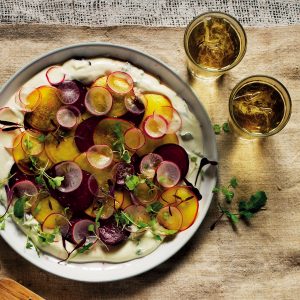Expert insight by a registered dietitian into how food affects your mood.
Did you know that the food you eat directly impacts your mood and brain health? We chatted to Joburg-based registered dietitian Aziwe Booi (@azi_booi) to find out more about how you can boost your mood through food.
When did your interest in food and nutrition begin?
It began with my love for cooking, baking and health at a young age. I was involved in the veggie garden at home and my parents’ healthy lifestyle positively impacted my own. I began packing my own delicious, healthy lunches.
I found out dietetics was a career where my love for health and helping people in a hospital setting could be achieved while also tapping into my passion for nutrition. It felt as though it was made for me, and the rest is history.
What is your food philosophy and approach to food, diets and healthy eating?
Don’t look at what you can restrict. Rather look at what to add into your diet. Add plenty of fruits and vegetables. Add more fibre into your diet.
Add more hydration in the form of water and herbal teas like rooibos. Add more movement to support your health.
Few people know that what you eat can impact your mental and physical health. Can you expand on this?
Nutrition plays a vital role in your mental health. The gut-brain axis connects our gut to our brain through a nerve called the vagus nerve. This is what makes food and mood directly linked to each other.
So, it’s crucial to support your gut health so you can support your mental health. More than 90% of serotonin (aka the “happy hormone”) is absorbed in the gut – especially when consuming a carb-rich meal.
What are the most common misconceptions people have about food and nutrition?
- Healthy eating is bland. You can add plenty of herbs and spices to make food flavourful. It doesn’t have to be boring.
- Nutrition can heal underlying conditions. Nutrition can help reduce your risk but not necessarily prevent or heal a condition once you’ve been diagnosed. It’s helpful with disease management and risk reduction but you need to take medication as prescribed if you receive a particular diagnosis.
- You don’t need carbs. Carbs are your body’s main energy source! They’re crucial for your health to give you fibre and maintain your energy throughout the day.
What are some of the best mood-boosting foods that you recommend?
1. Omega-3 essential fatty acids
These fatty acids are crucial to the health of our brains and are something our bodies can’t make: that’s where diet comes into play. A deficiency may result in increased risk of depression and anxiety and other symptoms like hair loss and rough, dry skin.
Aim for three portions per week (about 140g/serving) of oily fish such as tuna, salmon, pilchards, trout, mackerel or herring. Chia seeds and walnuts are both good plant-based sources, but they are not easily absorbed. Consult a health professional who can advise on how to use supplements for the best results, should you choose.
2. Carbohydrates
Eating a carb-rich meal or snack can increase serotonin production, which is why gut health is important in supporting mental health. Aim for five to six servings a day. Sources include potatoes, brown rice, corn, oats, wholewheat bread, butternut and pumpkin. Aim for wholegrain starches as they’re more satisfying and lead to sustained energy levels while improving your mood.
3. Probiotics
Probiotics are live micro-organisms which have the potential to reduce the inflammation commonly linked to depressive disorders. Studies have shown that probiotics have the potential to prevent dips in mood and psychiatric disorders in the present and future. Some fermented foods, like yoghurt and amasi, contain probiotics as well as gherkins and cheeses such as mozzarella, cheddar and cottage cheese.
4. Fruits and vegetables
Fruits and vegetables are a source of fibre, vitamins, minerals and have powerful antioxidant and anti- inflammatory properties, which have a variety of benefits for our mental health. Eating 7-8 portions of fruit and vegetables a day can reduce anxiety and depressive symptoms.
5. Flavonoids
Flavonoids are powerful plant chemicals high in antioxidants. This means that they get rid of free radicals roaming about in your system, causing damage to healthy cells. This will reduce inflammation, which benefits the immune and brain health and protects against Alzheimer’s disease, mood disorders and heart diseases. Add them to your diet with a daily glass of 150ml red wine, five portions of fruit and vegetables daily, and 35g of 80% dark chocolate occasionally.
6. Magnesium
This mineral is abundant in the body and supports more than 300 enzymes. It has the ability to modify the stress response, which offers protection against depression. Needs differ from person to person depending on their sex, lifestyle or health, so supplementation must be done under the guidance of a health professional. There are a variety of foods that are high in magnesium and can be regularly included in your diet. Try green leafy vegetables, fortified breakfast cereals, potatoes, kidney beans and raisins.
7. Zinc
This mineral is important for the functioning of all the body’s cells and contains anti-inflammatory and antioxidant properties, which both have an antidepressant effect. But too much zinc can be damaging, so consult a dietician beforehand.
Don’t worry though, it’s difficult to get high zinc levels through diet alone. Zinc should be consumed regularly in your diet. Foods like oysters, baked beans, green leafy vegetables, cheese, pumpkin seeds and cashews contain all the zinc your body and mind need.




